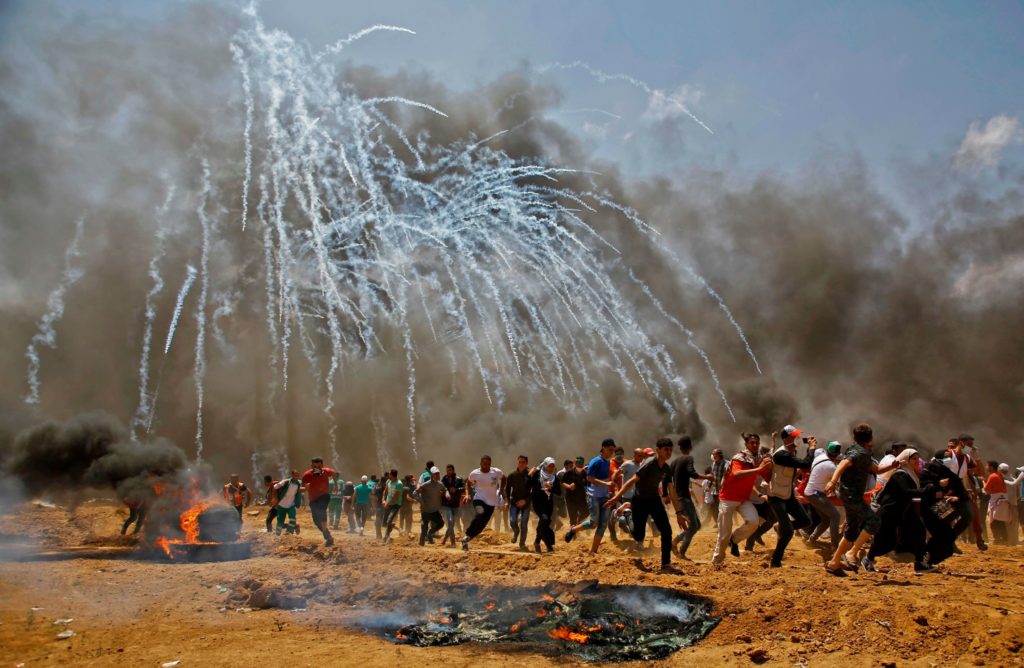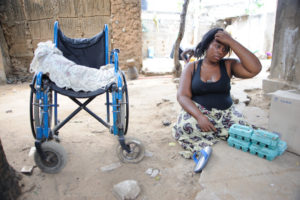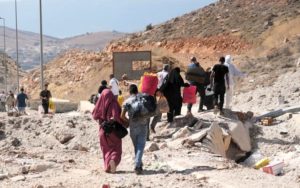A reflection on the capacity of human societies to allow slaughter and deliberate starvation, while sentencing others to incalculable suffering, raises questions about our inhumanity, complicity, and level of commitment to hold political, military and other leaders to account for egregious crimes.

For too long, there has been limited or no accountability for specific incidents and patterns of atrocity, war crimes, crimes against humanity, ethnic cleansing, genocide, forced displacement, destruction of food, water, agriculture and other assets essential for survival. Impunity can be attributed in part to a degraded multilateral system where hegemonic and commercial interests, coupled with great power rivalries, have effectively paralyzed the UN Security Council (UNSC) in recent times. There is an obvious need for fresh thinking on the political, economic and military dynamics of an interdependent but increasingly polarized and turbulent world. Lessons must also be learned from a long history of carnage and the political conditions that sustain evil agendas, whether these are orchestrated or are the banal outcome of indifference to monstrous cruelties. Pervasive impunity, aided and abetted by lackluster efforts to secure accountability, could be a useful place to start.
Atrocity has a long and repetitive history as ruthless leaders or groups have pushed to acquire, expand or consolidate wealth and power whatever the consequences for individual communities. The depravity of spare-no-one, scorched earth strategies – on and off the battlefield – in the first century BCE during the Gallic wars, in 16th century Ireland, during the US civil war, and in Guatemala in the 1980s exemplify deliberate and strategic barbarity. The non-stop coverage of what dehumanization, and its denial, means in Gaza, and the bloody devastation underway in Sudan, show contemporary humanity at its worst. Likewise, siege warfare and its calamitous consequences, is an historical fact that remains a feature of 21st century warfare. In Syria, this tactic was used to starve encircled towns or enclaves both by Assad and some opposition forces. Examples of deliberate starvation in living memory bring Biafra, Aleppo, Tigray, Yemen, Sudan and Gaza to mind.
The abomination of mass slaughter and other atrocities were recorded in different historical accounts but such events were, primarily, a concern to those individuals and communities who were directly affected. This pattern persisted with the emergence of the state-centric Westphalian system in the late 17th century. States consolidated notions of ‘sovereignty’ in a fashion that discouraged external concern about governance systems that murdered or tortured citizens at will. The horrific human cost of the Holocaust, fascist dictatorship, and World War II, coupled with the adoption of the UN Charter, recognition of ‘crimes against humanity’ at the 1945 Nuremberg Tribunal, the signing of the Genocide Convention (1948) and the Geneva Conventions (1949) heralded the start of a new dawn in the spirit of ‘Never Again’. However, norms of non-intervention to end atrocity prevailed including, for example, in the context of the Khmer Rouge killing fields in Cambodia. The Vietnamese invasion (1978) that routed Pol Pot was widely condemned by the West and its Asian allies.
In the short period of the 1990s interregnum – from the end of the Cold War to the 9/11 attacks on the United States (US) and the subsequent, knee-jerk launch of the so-called ‘Global War on Terror’ – there were multiple challenges to the non-intervention doctrine. The UN was called on to act in a string of crises such as Somalia (1993), the Rwandan genocide (1994), Srebrenica (1995) and Kosovo (1999). In 1999, the UN Security Council (UNSC) adopted a resolution on the protection of civilians in armed conflict an issue that was also debated in the UN General Assembly (UNGA).
The discourse on the merits or otherwise of ‘humanitarian intervention’ persisted in parallel to events leading up to the launch of the “Responsibility to Protect” (R2P) agenda that was adopted at the 2005 World Summit. In principle, this new norm reaffirmed Common Article One of the 1949 Geneva Conventions which requires all State Parties to “respect and to ensure respect” for International Humanitarian Law (IHL) in all circumstances. As Gareth Evans, a key architect and proponent of R2P, noted in 2008, it is “one thing to have a formal agreement and quite another” to have a situation that means “when the next conscience-shocking atrocity” occurs there will be a universal reflex “not to ask whether to act, but only where, when and how to act.” Unfortunately, the broad but not universal consensus that initially surrounded R2P has not survived. R2P has been used to useful effect on some occasions but came to be associated with regime change by Western states after it was invoked, officially for the first time by the UN in 2011, to authorize an intervention in Libya. Support for robust interventions has, since then, waned significantly. Fifteen UN peace missions were launched in Africa between 1994 and 2007 but the “hope that interventions and humanitarian aid would end wars was replaced by a cynicism that intervention only escalated them or made them messier.” Nonetheless, it is important to acknowledge some successes. These included the mediation work of former UN Secretary General Kofi Annan with a coterie of respected Africans to quell post-election violence resulting in death and displacement in Kenya, early 2008. Mediation talks ended the fighting and led to the formation of a coalition government and agreed reforms.
It is equally important to be aware of the many initiatives, in and outside inter-governmental infrastructure, that have been developed to address the atrocity-feeding, malignant significance of impunity. Efforts to hold perpetrators to account for egregious crimes include a series of Tribunals created in the 1990s such as the International Criminal Tribunal for Rwanda (ICTR) and the former Yugoslavia (ICTY). Tribunals, geared to address a specific set of criminal acts, were also established for Kosovo, East Timor, Lebanon, Sierra Leone and Cambodia. These Tribunals, coupled with other factors such as the broad consensus on the definition of genocide and other serious crimes, were important elements in the lead-up to, and adoption of, the Rome Statute in 1998. Seven countries – US, China, Iraq, Israel, Libya, Qatar and Yemen – voted against the adoption of the Statute. Russia withdrew (2016) its signature to the ICC further to its 2014 annexation of Crimea. The Rome Statute treaty entered into force in 2002 thereby creating the first permanent International Criminal Court (ICC) to help end impunity, put on notice would-be criminals, and buttress multilateralism and a rules-based international order.
The ICC has pursued investigations and convictions since its creation with its first verdict issued in 2012. It has been criticized for a perceived pre-occupation with Africa while ignoring, for example, the role of some high-profile Western leaders such as Tony Blair and George Bush in relation to the war in Iraq. In May 2024, forty-five UN human rights (HR) experts expressed alarm and dismay over statements made by Israeli and US officials threatening retaliation against the ICC in relation to its investigation of crimes reportedly committed in Palestine. This investigation, concerned with alleged crimes since 2014, includes ongoing hostilities in occupied Gaza and the West Bank.
Experience shows that the task of ensuring a reckoning for atrocity in a formal, judicial process is an uphill battle. It is also time-consuming, expensive and is greatly constrained by might-is-right political agendas. Since the ICC does not have any enforcement capabilities per se, it is dependent on States to facilitate pre-trial actions such as arrests and taking the steps necessary to ensure defendants show up in court. The ICC’s efforts to arrest and prosecute Sudan’s President Omar Al-Bashir on Darfur genocide charges illustrate the court’s lack of institutional resources. It also highlights the poor compliance and lack of collaboration of signatory states and others that is further complicated by the veto power of the UNSC’s Permanent Five.
When politics is at odds with accountability for egregious crimes in relation to individuals that are considered above the law, it is difficult, if near impossible, for justice to prevail.
The International Court of Justice (ICJ), the principal judicial organ of the UN is, at first glance, well situated, given its core mandate, to challenge impunity. Established in 1945, with the adoption of the UN Charter, its two critical functions are to (a) settle legal disputes, submitted by states, in accordance with international law and (b) provide advisory opinions on legal questions to the UNSC, UN General Assembly (UNGA) and other UN entities. On paper, the UNSC and the ICJ have a symbiotic relationship; the Council, for example, is responsible for addressing instances of state non-compliance with ICJ judgements. However, the UNSC has made little use of the ICJ in the maintenance of international peace and security. Nonetheless, there is broad acknowledgement – at least rhetorically – that compliance with ICJ decisions would strengthen, globally, the rule of law including in terms of dispute resolution and peace more generally. In an Open 2023 Debate at the UNSC more than 70 states affirmed the importance of ensuring respect for the ICJ’s compulsory jurisdiction, and that compliance with its decisions is an essential element of safeguarding the rule of law.[7] However, this meeting also made clear that there are substantive differences of opinion on the contemporary meaning of a ‘rules-based international order’. Such phraseology is seen by some states as ambiguous and, thus, a means for hegemonic states to impose their will on others. In other words, global ordering needs to be free of coercive policies that are seen as antagonistic to traditional notions of sovereignty, mutual respect, and peaceful co-existence in a multi-polar world.
Multilateralism is Undermined
The risk of lawlessness, atrocity, and impunity increases when state authorities, big and small, trample norms and the treaties geared to securing a just and peaceful global order. An obvious example of the many hurdles that impede the effectiveness of the ICJ is the ongoing case, brought to the Court by South Africa against Israel, on the danger of genocide unfolding in Gaza. While the Court has yet to rule on the merits of the case – a process that will likely take a few years – it has issued different sets of provisional measures. In January 2024, the ICJ ordered Israel to take all necessary measures to prevent breaches of the Genocide Convention and reaffirmed this in March. After Israel launched an offensive on Rafah – a city that forcibly displaced civilians had swelled to more than a million – the ICJ again intervened in May. Its call for an immediate halt to military operations and any other actions in the Rafah governorate was ignored. In July, the ICJ ruled that Israel’s occupation of Palestine is illegal and must end.
Israel routinely and consistently claims that it operates in compliance with international law notwithstanding mountains of evidence to the contrary. It does so in the knowledge that the US, and other states such as France, Germany and the UK, have long provided military equipment to Tel Aviv. Such support, buttressed by UNSC vetoes notwithstanding well-documented massacres, disruption of aid supplies as starvation threatens famine, and repeated coerced displacements indicate a purposeful lack of interest in the findings of the ICJ. It also ignores the evidence in countless studies and reports on the scale and depth of the depravity that signals an overdue reckoning for such unconscionable barbarity. The enablers of the dehumanization that has long scarred the history of Palestinians demonstrate their indifference to, and complicity with, the horrific crimes the children of Gaza, and their families, are made to endure. This exhibits a profound disregard for a rules-based order. It also shines a light on the hypocrisy and double standards increasingly associated with Western and other countries that have long cherished the self-proclaimed narrative of being champions of human rights, justice and freedom.
Nine months and counting since the indefensible Hamas attack on Israel last October, and the subsequent carnage that has engulfed Gaza, much of humankind is numbed by the daily slaughter, enraged at our collective willingness to allow such atrocities to persist, and shocked that, collectively, we tolerate such systemic and systematic cruelty. Reactions of everyday citizens include spontaneous and organized action such as taking to the streets calling for a ceasefire, student campus sit-ins around the world, contacting elected representatives and mobilizing or expanding boycotts and sanctions mechanisms. Numerous campaigns are working hard to stop arms sales or to advance efforts to officially recognize the State of Palestine as well as dedicated attention to achieving a viable one-state or two-state solution. Musicians have held concerts. Book clubs have raised money to support education in Gaza. Top-of-art communication technologies and media platforms have increased awareness and informed debates so that millions of people are vocal in expressing their moral angst while pushing for change. Some of this energetic tide of concern is reflected in various UNGA emergency and other meetings with a significant majority calling for an end to the violence, recognition of the Palestinian state, and greater Palestinian participation in the world body.
It is not yet clear whether the shared trauma of Gaza, and other turbulent hotspots, represent an inflection point that signals a shift in attitudes to cynical geo-political agendas and the way civilians are dehumanized and brutalized. But few will disagree that atrocities, and their enablers, need to be held to account. To not do so is to enable impunity and the type of hypocrisy that tut-tuts the unprecedented killing and maiming of more than two-percent of Gaza’s children while arming, or otherwise facilitating, unrestrained and undifferentiated warfare.
Conclusion
As we approach the end of an era demarcated by Pax Americana and Western-style multilateralism distorted by neo-colonialism, challenges to the laws of war and human rights norms are set to increase, as will atrocity trends dutifully fed by impunity. The world is shifting from competitive style multilateralism to an evolving multi-polar world order populated by regional and diverse ‘pragmatic’ alliances. The lack of appropriate non-Western representation in the UN and other post-WWII inter-governmental infrastructure will further weaken these institutions. The prospect of peaceful resolution of disputes will likely diminish as the upward incidence of armed conflict persists. Already, some two billion people “a quarter of the global population …now live in conflict-affected areas.”
As in the past, economic and security interests will likely take precedence over a just, stable, climate-friendly global order. The growth of polarized societies in the traditional democracies, coupled with the changing nature of globalizing trends and the accumulation of power, countries such as China – a digital supremo and trading giant – will increasingly shape the parameters of a new balance of power. In a multi-polar global framework the previously dominant West will occupy a more limited space than before. The extent to which this greatly changed global order will provide opportunities to build a more sane, safe and humane world that rejects the sordid self-interested policies of the past will depend, significantly, on the energy and commitment of collaborative, grass-roots activism and accountable governance. The obvious lessons of humanity’s blood-stained history, coupled with the many tools provided by the digital revolution, need to be maximized to mobilize concerned citizens everywhere. This includes the many who are disgusted, enraged and eager to be part of an anti-atrocity-end-impunity movement that is rooted in a “We the Peoples” campaign opposed to the usurpation of freedom and the dehumanization of fellow human beings everywhere. Importantly, this needs to be a local, regional and joined-up global endeavour that is free of the usual power politics at odds with the core tenets of a shared humanity.
While Isabel Allende noted that ‘Nothing’s as dangerous as power with impunity’ one can also ask how comfortable we all are with unfettered abuse of power? A central question confronting citizens everywhere is how to join arms with others, near and far, to push for an end to the economic and political conditions that shape atrocity, impunity and the dehumanization this entails.
About the author: Norah Niland is a long-time humanitarian and human rights practitioner who first engaged in challenging social injustices as a teenage civil rights activist in Northern Ireland. More recently, Norah worked in Afghanistan as head of the UNAMA human rights team that developed a program to reduce the direct impact of war on civilians with the use of evidence-based advocacy.
The content is the author’s responsibility alone and does not necessarily reflect the views of UAI or any of its members.











